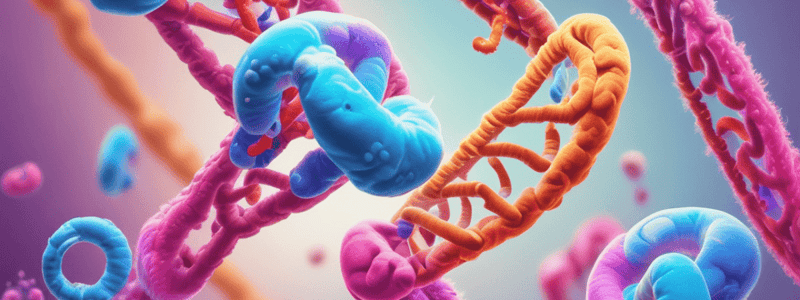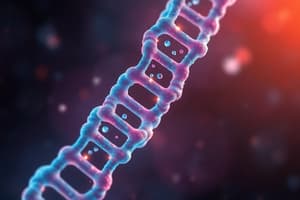Podcast
Questions and Answers
Quin tipus d'aneuploïdia es pot associar amb el síndrome de Down?
Quin tipus d'aneuploïdia es pot associar amb el síndrome de Down?
- Monosomia 21
- Trisomia 21 (correct)
- Monosomia X
- Trisomia 18
Quina és una de les conseqüències de la non-disjunció cromosòmica durant la meiosi?
Quina és una de les conseqüències de la non-disjunció cromosòmica durant la meiosi?
- Problemes de creixement (correct)
- Major resistència a les infeccions
- Increment dels nivells d'energia
- Augment de la intel·ligència
Quin factor pot influir en la probabilitat de la non-disjunció cromosòmica durant la meiosi?
Quin factor pot influir en la probabilitat de la non-disjunció cromosòmica durant la meiosi?
- Consum d'alcohol moderat
- Baix nivell d'activitat física
- L'edat avançada materna (correct)
- Consum regular de antioxidants
Quin síndrome està associat amb la monosomia X?
Quin síndrome està associat amb la monosomia X?
Quin és un factor comú que pot provocar la non-disjunció cromosòmica durant la meiosi?
Quin és un factor comú que pot provocar la non-disjunció cromosòmica durant la meiosi?
Quina és una de les complicacions associades amb els trastorns genètics causats per la non-disjunció cromosòmica?
Quina és una de les complicacions associades amb els trastorns genètics causats per la non-disjunció cromosòmica?
Què és l'aneuploïdia?
Què és l'aneuploïdia?
Quina condició es dóna quan hi ha un cromosoma addicional en totes les cèl·lules?
Quina condició es dóna quan hi ha un cromosoma addicional en totes les cèl·lules?
Quin és un exemple comú de trisomia que provoca el Síndrome de Down?
Quin és un exemple comú de trisomia que provoca el Síndrome de Down?
Què és la monosomia?
Què és la monosomia?
Què és la no-disjunció de cromosomes?
Què és la no-disjunció de cromosomes?
Què causa molts casos d'aneuploïdia i desordres genètics associats?
Què causa molts casos d'aneuploïdia i desordres genètics associats?
Què és l'aneuploïdia i com es manifesta en la trisomia 21?
Què és l'aneuploïdia i com es manifesta en la trisomia 21?
Què és la monosomia i què la provoca?
Què és la monosomia i què la provoca?
Quines conseqüències pot tenir la no-disjunció cromosòmica durant la meiosi?
Quines conseqüències pot tenir la no-disjunció cromosòmica durant la meiosi?
Com pot influir l'edat materna avançada en la probabilitat de no-disjunció cromosòmica?
Com pot influir l'edat materna avançada en la probabilitat de no-disjunció cromosòmica?
Quins són els factors que poden causar no-disjunció cromosòmica en la meiosi?
Quins són els factors que poden causar no-disjunció cromosòmica en la meiosi?
Quins són els possibles desordres genètics que poden resultar de la no-disjunció cromosòmica durant la meiosi?
Quins són els possibles desordres genètics que poden resultar de la no-disjunció cromosòmica durant la meiosi?
Flashcards are hidden until you start studying
Study Notes
Overview of Chromosome Non-Disjunction in Meiosis
Chromosome non-disjunction is a crucial aspect of genetic inheritance, affecting the distribution of chromosomes in the offspring and contributing to several congenital disorders. During meiosis, non-disjunction often leads to abnormalities such as aneuploidy, including conditions like trisomy and monosomy. Understanding the causes and consequences of chromosome non-disjunction is essential for advancing knowledge in genetics and developing strategies for preventing or treating related diseases.
Aneuploidy and Nondisjunction
Aneuploidy is a condition characterized by an abnormal number of chromosomes in a cell, leading to developmental issues or reduced viability. A common example of aneuploidy is Down syndrome, which occurs due to an extra copy of chromosome 21 (trisomy 21). Nondisjunction, the failure of chromosomes to separate properly during meiosis, is responsible for many cases of aneuploidy and consequential genetic disorders.
Trisomy
Trisomy is a form of aneuploidy marked by the presence of one extra chromosome in all cells. One of the most well-known examples is trisomy 21, which accounts for over 90% of Down syndrome cases. The extra chromosome leads to various developmental and intellectual challenges associated with this condition.
Monosomy
Monosomy refers to the absence of a single chromosome, resulting in 45 total chromosomes instead of the typical 46 in humans. This form of aneuploidy can lead to severe health issues, including growth problems, intellectual disability, and a higher risk of infection due to a compromised immune system.
Causes of Chromosome Non-Disjunction
Chromosome non-disjunction can occur during meiosis due to various factors, such as errors in cell division mechanisms, homologous recombination, and the length of telomeres. Some common causes include:
- Aging: Advanced maternal age increases the likelihood of chromosome non-disjunction, particularly for those undergoing oogenesis.
- Altered Recombination Patterns: Variations in the process of genetic exchange between homologous chromosomes can influence the probability of non-disjunction.
- Meiotic Defects: Issues in the machinery responsible for separating sister chromatids during meiosis I (MI) or meiosis II (MII) may contribute to non-disjunction.
Genetic Disorders Associated with Chromosome Non-Disjunction
Chromosome non-disjunction is responsible for various genetic disorders, including Down syndrome (trisomy 21) and Turner syndrome (monosomy X). These conditions can lead to intellectual disability, developmental delays, congenital heart defects, immune issues, and other health complications.
Conclusion
Understanding chromosome non-disjunction during meiosis is crucial for advancing our knowledge of genetic inheritance and developing strategies to prevent or treat related disorders. As we continue to explore the complex mechanisms underlying this phenomenon, we may uncover novel approaches to improve reproductive health and minimize the risk of genetic diseases associated with nondisjunction.
Studying That Suits You
Use AI to generate personalized quizzes and flashcards to suit your learning preferences.




